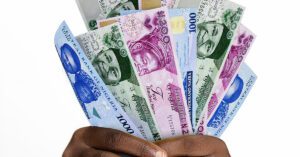
In recent times, the Nigerian exchange rate has been a topic of concern to everyone. Nigeria operates a multiple-exchange-rate system, which includes the official exchange rate. The parallel market rate (also known as the black market rate), and the Investors and Exporters (I&E) window rate.
According to the Central Bank of Nigeria, the evolution of the foreign exchange market in Nigeria up to its present state was influenced by a number of factors. Some of the factors include the changing pattern of international trade, institutional changes in the economy and structural shifts in production.
Before the establishment of the Central Bank of Nigeria (CBN) in 1958 and the enactment of the Exchange Control Act of 1962, foreign exchange was earned by the private sector and held in balances abroad by commercial banks which acted as agents for local exporters.
It also let us know that agricultural exports contributed the bulk of foreign exchange receipts. The fact that the Nigerian pound was tied to the British pound sterling with easy convertibility, delayed the development of an active foreign exchange market. However, with the establishment of the CBN and the subsequent centralisation of foreign exchange authority in the Bank, the need to develop a local foreign exchange market became paramount.
The official exchange rate is set by the Central Bank of Nigeria (CBN) and is typically lower than the parallel market rate. This official rate is primarily used for government transactions, while individuals and businesses commonly use the parallel market rate for transactions not covered by official channels.
The parallel market rate is influenced by various factors, including the supply and demand dynamics of foreign currency, economic policies, inflation, and fiscal conditions. Exchange rate volatility in Nigeria can be attributed to factors such as the country’s dependence on oil exports, which makes it vulnerable to fluctuations in global oil prices, as well as other economic challenges such as inflation and scarcity of foreign currency.
As of last month(October 2023), a dollar to Naira was over 1,000, now this week(been 3rd of November), it is 788.
In relation to the above, it’s important to note that exchange rates fluctuate frequently. Therefore, it is wise to refer to reputable and up-to-date sources such as financial institutions, currency exchange bureaus, or online platforms that provide real-time exchange rate information for your business needs.



